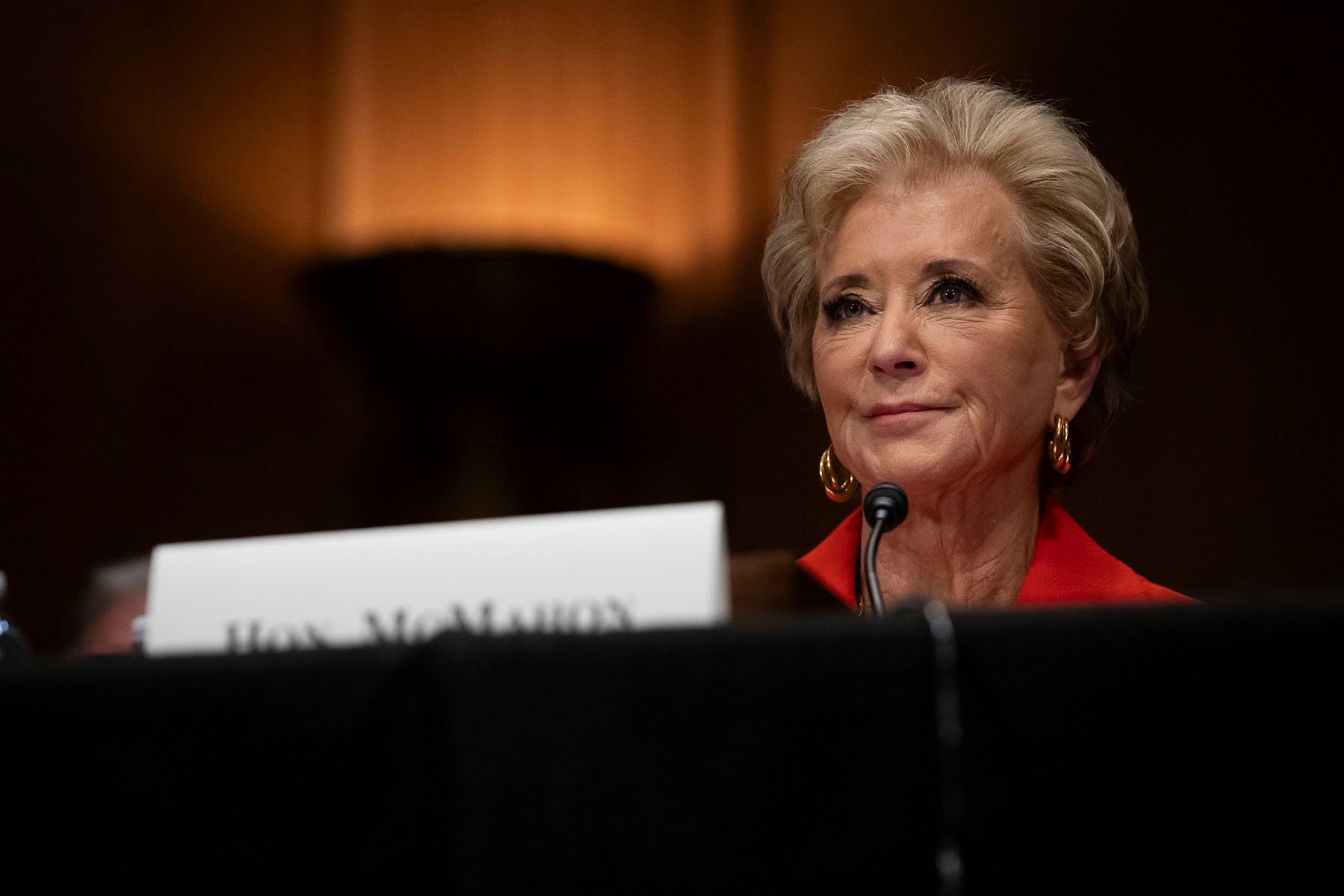Linda McMahon is making a pitch for a job she may not fill for long: education secretary.
During the nominee’s confirmation hearing on Thursday, members of the Senate Health, Education, Labor and Pensions (HELP) Committee asked McMahon to discuss a broad range of issues — school choice, students with disabilities, sex discrimination, teacher pay and cost-cutting efforts. But the question that nearly became a refrain during the hearing was what her approach would be to President Donald Trump’s plans to dismantle the Department of Education, the federal agency she would run if her nomination succeeds.
While McMahon acknowledged that eliminating it would take an act of Congress, she made it clear that she’s prepared to carry out Trump’s objectives for the agency.
“I am really all for the president’s mission, which is to return education to the states,” she said, ignoring that states already set curriculum standards and oversee student achievement. “I believe, as he does, that the best education is closest to the child.”
In recent weeks, fears about the department’s future have mounted after the Trump administration placed dozens of department employees on leave and slashed almost $900 million in funding from its research arm, the Institute of Education Sciences (IES). Teams from the Elon Musk-led effort to cut federal spending and the workforce, known as Department of Government Efficiency (DOGE), set up shop in the Department of Education over a week ago. They have since canceled 89 of the agency’s contracts and 29 of its grants, including those involving research on students with disabilities and training on diversity, equity and inclusion (DEI) — an ideology Trump strives to excise from public life.
“The Department of Education’s a big con job,” Trump told reporters on Wednesday. He said that he’d “like it to be closed immediately.” Last week, he said that he wanted McMahon to put herself out of job if confirmed as education secretary, a comment widely taken to mean that he wants her to lead the agency’s disbandment.
During her hearing, which protesters disrupted about a half-dozen times, McMahon said that she and the president have already discussed developing a plan for “a better functioning Department of Education” to present to Congress. She described the department as overly bureaucratic, remarking that teachers have grown tired of “the red tape on their desks.” But the nation’s largest teachers union, the National Education Association, opposes her nomination as education secretary.
McMahon’s supporters on the HELP Committee made the case for overhauling the department. Committee Chairman Bill Cassidy of Louisiana said that “downsizing” the agency would not deprive schools of federal funding. McMahon agreed.
“It is not the president’s goal to defund the programs, only to have it operate more efficiently,” she said.
But some committee members, Democrats and Republicans alike, wondered how the programs and regulations the agency manages would be properly enforced if it were abolished. Sen. Susan Collins, a Republican from Maine, told McMahon that most schools in her state rely on the funding the department administers to support students with disabilities or youth from low-income households. In response, McMahon reiterated that the Department of Education’s closure would not affect funding for such programs and suggested funding for students with disabilities might be better managed by the Department of Health and Human Services (HHS).
“So, I just want to be clear,” Sen. Maggie Hassan, a Democrat from New Hampshire, quipped: “You’re going to put special education in the hands of Robert F. Kennedy Jr.?”
The newly confirmed HHS secretary has been accused of endorsing pseudoscience and promoting the anti-vaccine movement, which critics say endangers vulnerable children.
McMahon’s detractors, meanwhile, have emphasized her lack of education experience. She chairs the America First Policy Institute, a think tank that promotes Trump’s public policy platform, but the billionaire and her now estranged husband, Vince McMahon, are best known for co-founding World Wrestling Entertainment (WWE) in 1980. After her stint leading the Small Business Administration starting in 2017, McMahon led America First Action, a super PAC started by Trump campaign officials. She has given millions to pro-Trump super PACs, emerging as a major Republican donor after losing two senatorial bids in Connecticut in 2010 and 2012.
McMahon’s education background amounts to serving on Connecticut’s State Board of Education from January 2009 to April 2010 and on the trustee board at Sacred Heart University in Fairfield, Connecticut, intermittently since 2004. Sen. Patty Murray, a Democrat from Washington, pressed McMahon to answer whether she was familiar enough with laws like the Every Student Succeeds Act (ESSA) to name a couple of its requirements. The legislation replaced No Child Left Behind and requires states to implement rigorous learning standards for students.
McMahon said that she had read through the law, calling it “very interesting,” but said that she would need to study it further to go into specifics about it.
McMahon also appeared not to entirely understand the Trump administration’s stance on Title IX, the civil rights law that prohibits schools that practice sex discrimination from receiving federal funding. She was aligned with the White House when some Republicans, including Sen. Josh Hawley of Missouri, asked her how to ensure that colleges comply with Trump’s executive order to keep students assigned male at birth from playing on women’s sports teams.
“I do not believe that biological boys should be able to compete against girls in sports,” she said.
The businesswoman said that this restriction mirrors Title IX’s original intent to protect students from sex discrimination.
“And women should feel safe in their locker rooms,” McMahon said. “They should feel safe in their spaces. They shouldn’t have to be exposed to men undressing in front of them.”
But she parted with the Trump administration, seemingly unknowingly, on Title IX’s role in prohibiting sexual harassment. On January 31, the administration announced that it would begin enforcing the Title IX regulations developed under Betsy DeVos, education secretary during Trump’s first term. Those regulations characterized sexual harassment as conduct that is “severe, pervasive and objectively offensive.”
When Sen. Tammy Baldwin, a Democrat from Wisconsin, asked McMahon if she thought only severe or pervasive sexual harassment in schools should be investigated, the nominee answered that no degree of sexual harassment should go unchecked. McMahon also said she believed schools should investigate cases of sexual misconduct involving students that occur off campus, another departure from the DeVos Title IX rule.
McMahon faces her own allegations related to sexual misconduct. She and her husband are accused in a lawsuit of ignoring a WWE employee’s sexual abuse of “ring boys” in the 1980s and ’90s. The ring boys set up and broke down wrestling rings. On February 3, the Supreme Court of Maryland allowed the case to proceed.
“My clients’ lives were destroyed by the defendants who allowed and enabled the open, rampant sexual abuse to occur for years,” said Greg Gutzler, a partner with the law firm DiCello Levitt, in a statement. The firm is representing the accusers in the suit against the McMahons, WWE and TKO Group Holdings. “The abuse inflicted on my clients was inexcusable; they were mere children and had the right to expect that WWE executives would take action to protect them from the predators working within the WWE.”
In November, an attorney for McMahon sent The 19th a statement denying that her client is responsible for any wrongdoing. But in light of these allegations, Baldwin told McMahon during the confirmation hearing that she questions whether student survivors of sexual assault can depend on the nominee to support them.
McMahon did not discuss the lawsuit, but attempted to reassure Baldwin. “Senator, they certainly can trust me to support them,” she said.
“I have a granddaughter that is now in college,” McMahon added. “I have two grandsons who are in college, and I have deep commitment of understanding of how I would feel if any of them were involved in sexual harassment or accused of sexual harassment. You have my absolute commitment that I will uphold and protect those investigations to make sure that those students are treated fairly on both sides.”
Sen. Bernie Sanders, an independent from Vermont and the ranking member on the committee, questioned McMahon about student debt and teacher pay. In 2023, he introduced legislation to guarantee teachers nationwide a minimum salary of $60,000 per year. McMahon refused to say that teachers deserve a minimum salary.
“I would certainly recommend to states that teachers be paid what is commensurate with the kinds of jobs that are part of their states,” McMahon said. “Not all states have the same living costs, not all states have the same ability to pay teachers, but to attract really good teachers and to keep them, we should definitely pay them commensurate with the job performance that they’re undertaking.”
Sanders also expressed concern about the Trump administration’s emphasis on school choice. Trump issued a recent executive order asking the Department of Education to find ways for federal funds to be routed to families seeking the opportunity to send their children to their preferred private, public or religious school. Many school choice proponents back vouchers, or using taxpayer funds to pay for private school. Foes of vouchers say they siphon valuable resources from public schools. McMahon supports expanding school choice and “parents’ rights” in education.
“We must not allow our educational system to become a two-tier system, a system which says that if you have the money, you’re going to get help from the federal government, you’ve got to get a voucher to send your kid to a school that may cost $50-, $60,000 a year, while the public schools will end up being segregated, not just by race, but by class,” Sanders said. “Most families in America do not have $40- 50-, $60,000 a year to send their kids to private schools, and it’s absurd to provide public money to make that possible. Our job is not to take away money from public schools to give it to private schools.”
Sen. Lisa Murkowski, a Republican from Alaska, said that in many parts of her state, public schools are the only option available to her constituents.
As the Department of Education’s future appears uncertain and Musk’s influence over Trump and federal spending has sparked outcry, the senators asked McMahon if she supports DOGE’s access to data systems in the department and other federal agencies.
“It is my understanding that DOGE employees have onboarded as employees of the Department of Education, and therefore they operate under the restraints of utilizing access of information and they’re constrained by that,” McMahon said.
Already, attorneys representing University of California students have sued to stop DOGE from reviewing this data due to potential privacy breaches since families share sensitive information on documents like the Free Application for Federal Student Aid [FAFSA]. For now, DOGE officials have agreed not to access the department’s data systems until Monday.
Should McMahon be confirmed as education secretary, an executive order from the Trump administration announcing plans to gut or close the Department of Education is expected to follow soon afterward, according to reports.






